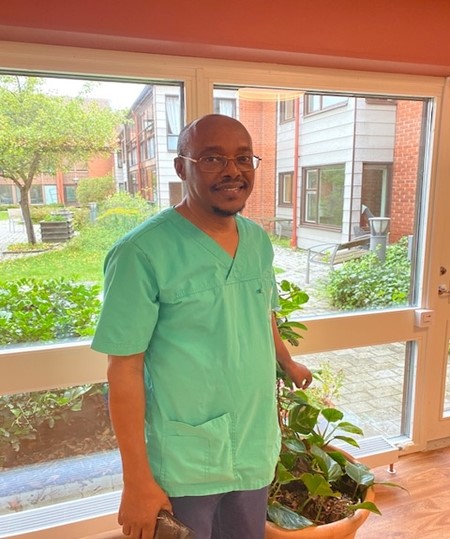The path to in-demand competence
12 December 2023According to Firmin Ndereyimana, the path to a job in Sweden has been relatively smooth. Firmin arrived in Lund in 2021 and began studying Swedish for Immigrants (SFI) immediately. After passing all of the levels of SFI, he was put in touch with Kompetenstrappan [The Competence Ladder], a project that trains people outside the labour market for jobs in the health and welfare sector.

Firmin explains that he learned a great deal through Kompetenstrappan that has come in useful in working life. Not least, he was offered a placement at the Papegojalyckan nursing home in Lund through the project, where he is now employed as a care assistant.
“I’m never twiddling my thumbs during the working day,”
Firmin says that he really enjoys his job as a care assistant on a dementia ward.
“Taking care of the elderly is a big responsibility. They have a wealth of experience and have worked for many years, so it feels good to be able to help them. I’m never twiddling my thumbs during the working day, there’s always something to do. I prepare food, help to feed those who need it, go on walks with them, read the newspaper and help with their nursing. The day flies by.”
Firmin explains that the job has been a bridge for learning the language.
“When I began here, I didn’t dare to speak much Swedish but now I ask my colleagues when I don’t understand something, which has been great for my language development. I have also continued to study Swedish as a second language as well as a nursing course, so that I can give medication to patients.”
Wants to train as an assistant nurse
In his homeland, Burundi, Firmin worked for many years as an accountant at the Ministry of Finance. However, he has no plans to return to the profession in Sweden. Instead, he hopes to continue working at the Papegojalyckan nursing home while training to be an assistant nurse.
“I hope to be able to continue working in elderly care if my Swedish residence permit is renewed,” says Firmin.
Kompetenstrappan is part of the project Individual Resources – Individual Support (IRIS), which is run by the financial coordination associations in Lund, Southeast Skåne and Höganäs, with the aid of funding from the Swedish ESF Council. The initial project period was September 2020 to February 2023 and new funding has recently been granted within ESF+.
Kompetenstrappan – a stamp of quality
Jakob Svensson is project manager for Kompetenstrappan. He explains the background to the project, which was initiated by Lund Municipality in response to a clear need to employ more people in health and welfare. While Kompetenstrappan is a first step into the occupation and many people are offered employment after participating in the programme, the organisers are keen to continue training participants.
The combination of training activities, such as placements and language support, has given the programme a stamp of quality. Employers are only too happy to employ graduates of the programme.
“We receive vital support for the project from HR within the municipality’s Health and Welfare Department. This has helped opened doors to management, but also to obtain placements for participants and feedback on their competence and language skills,” says Svensson.
Once in the workplace, the programme also offers fantastic support to participants.
“Many of those who have participated in the training were outside the labour market for long periods, and they are very grateful for the opportunity to work that they are offered.
Still, not everyone is suited to working in the caring professions. The project wants to attract those who are interested in working in nursing and who are suited to it,” explains Svensson.
Other subprojects within the framework of IRIS include VSB, which provides interagency financial coordination for adults, and USB, which does the same for young people, INSAM, IRIS Höganäs and IRIS Sydöst.
